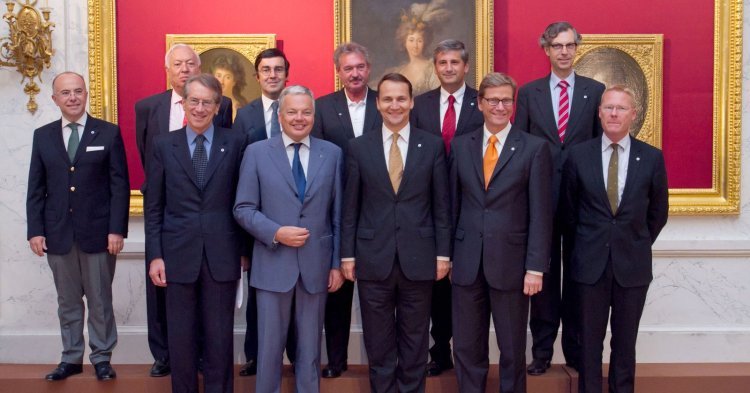All in
Considering that Europe is at “a decisive juncture” where it can either fall apart or radically integrate, 11 EU countries (Austria, Belgium, Denmark, France, Germany, Italy, Luxembourg, Netherlands, Poland, Portugal and Spain) have decided to lay the grounds for Europe’s potentially greatest leap forward. Their proposals are radical and concrete. They want an integrated financial, budgetary and economic policy framework to solve the euro crisis. They want to reform the European External Action Service (EEAS) to transform it into a pan-European foreign Ministry, with decisions by majority voting, a pan-European border control police, and even a European army. They propose a “Eurozone Parliament” involving national MPs and MEPs to enhance democratic legitimacy. Most radically, they seek to renew European governance through a “directly elected Commission president who personally appoints the members of his ‘European government’, a European Parliament with the powers to initiate legislation and a second chamber for the member states.”
All this is very well, but one cannot help having a feeling of “déjà vu”: the EU has a famous habit to ceremoniously set itself ambitious goals that never see the light. An integrated financial framework? Two and a half years of crisis have shown us how Europeans fundamentally disagree on what it should look like. A beefed up EEAS? That was also a good idea before it got killed off by the astonishing activism of a Trojan horse – Lady Ashton. An elected EU President? The idea has been around for a long time but has always ranked as high as plug standardisation on the political agenda. No, the really groundbreaking aspect of this Future of Europe group initiative is that it breaks the taboo of a multiple speed Europe.
Why wait for others when you all want to go forward?
“In a realistic view, in the long term Treaty reform in a EU of 28 or more Member States will become more and more difficult.” This is a word it took a long time for the EU to learn: “realistic”. Until recently, it was always considered that Member States would all eventually join the core EU (Eurozone and Schengen), except for a few rather odd-minded countries which required an opt-out. With the Future of Europe group initiative, the policy process is reversed: instead of waiting for a maximum number of member states to reach a consensus (which inevitably leads to policies being watered down), a core group of EU countries would decide to go forward without waiting for the others. This approach is powerful as it leaves policies unscathed (and hence more coherent) while forcing the other member states to abide by the majority’s will, should they decide to join in. The group explicitly acknowledges the need to “prevent one single member state from being able to obstruct initiative.” (A skilfully disguised reference to the UK).
This initiative is very positive for Europe as it changes the focus from the euro crisis to what the European project really is about. There has been too much debate on “how much will saving the euro cost?” and too little on “What are we, as a political community, gaining form the euro?” Europe is so much more than debt mutualisation and bailouts, but people seem to have forgotten it these days. Crisis times are the best moments to ask ourselves the most relevant questions and make life-changing decisions. Letting core EU countries strengthen their political commitment to Europe is the best way to re launch the European project. However, the EU cannot afford to leave citizens aside this time.
Bottom-up, not top-down
The 11 EU foreign ministers have been brainstorming for 9 months before putting forward these proposals. This is precisely the problem. Whatever the proposals, they remain on a top-down basis, dreamt by the highly educated elites of Europe’s capitals. These proposals should not have emerged from diplomatic discussions in the cosy closed-up rooms of foreign ministries. These should have arisen from public debates involving the numerous social, economic and political actors of our lively European societies. They have their word to say as well. The paper rightly recognises that “in many parts of Europe, nationalism and populism are on the rise, while the feeling of solidarity and sense of belonging in Europe are dwindling.” European politicians need to understand that what attracts some people to these extreme political parties is the feeling that they do not have a grip on their own lives, whoever they vote for. The only way to restore this “dwindling confidence” in Europe is to have EU-wide debates about what Europe should look like. Initiatives such as Angela Merkel’s “Ich will Europa” are excellent, but again they remain too domestically focused.
The Future of Europe group made a crucial step forward with their initiative. But now, dear European Ministers, please get out of your Quai d’Orsay, Bundesministerium für Auswärtiges Amt, Palacio de la Moncloa and other diplomatic centres. Europe is no longer about diplomacy but internal affairs. Spend your Sundays under a wide tent in a park and invite people to come and talk to you. Wander around in local markets; you will be surprised how people are actually interested in Europe. Travel to other countries and talk to people in their own language, you will seem less of a foreign remote technocrat. These people might not vote for you as they are not (yet) your constituents, but the decisions you take certainly have an impact on their lives as well.

Follow the comments: |
|
